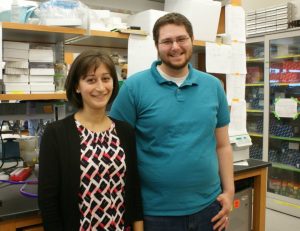
Students at The Ohio State University College of Veterinary Medicine Marisa Maglaty (left) and Alexander Diedrich (right), pose in their lab at the Biomedical Research Tower in July 2015.
Two Ohio State veterinary students, Alexander Diedrich and Marisa Maglaty, are inspecting genes that are scientifically correlated with the development of various cancers.
Irregular cell cycles, such as the loss of control over cell growth or cell death, underlie many human and animal cancers.
Maglaty is studying the gene E2F8, a member of a larger family of genes called E2F, which is vital to coordinating progression through the cell cycle. E2F8 differs in structure from other E2F genes, Maglaty said, and she and her team are marking its locations throughout the cell cycle using a mouse model. This technique allows for observation of which genes and proteins E2F8 directly interacts with. Understanding the specifics of these processes is yet another step in the fight to cure cancer.
“The more knowledge we gain through basic discoveries, the more we help humans and animals,” Maglaty said.
Diedrich’s research focuses on PTEN, a gene that is widely expressed throughout the body, and its role in endometrial (uterus lining) cancer. If functioning correctly, PTEN works as a tumor suppressor, possibly preventing cells from growing and dividing too rapidly. Mutations of the gene are believed to be a step in the formation of many cancers.
Cancer of the endometrium occurs more frequently in developed countries, and has the highest incidence rate of gynecologic cancers in U.S. women, according to the Centers for Disease Control and Prevention. Diedrich will gain a better understanding of the tumor-suppressing effects of PTEN in female mice by measuring the degree to which certain genes are being expressed during stages of the estrous cycle (a mouse’s menstrual cycle).
Diedrich and his team hypothesize that anything that changes the normal function of the estrous/menstrual cycle could be a risk factor for developing endometrial cancer, since PTEN is important in regulating these cycles. For example women who take tamoxifen, a drug that treats breast cancer, often develop endometrial cancer later in life, Diedrich said. They think this may be because tamoxifen alters hormone signaling.
“Oncology research tends to flow across species,” Diedrich said. “So although this study focuses on human medicine, it feeds back into veterinary medicine.”
Both of the students are working under Dr. Gustavo Leone, professor in the College of Medicine’s Department of Molecular Genetics .The research teams aim to evaluate how these genes perform in combination with mice’s normal physiology, as opposed to in vitro, Leone said.
Scientists have a good idea of how E2F8 and PTEN operate throughout cell and estrous cycles, and this study will give them concrete evidence to confirm existing hypotheses.
“We’re pretty sure of where the genes should be, and when,” Leone said, “But we haven’t actually seen them there.”
Comments are closed